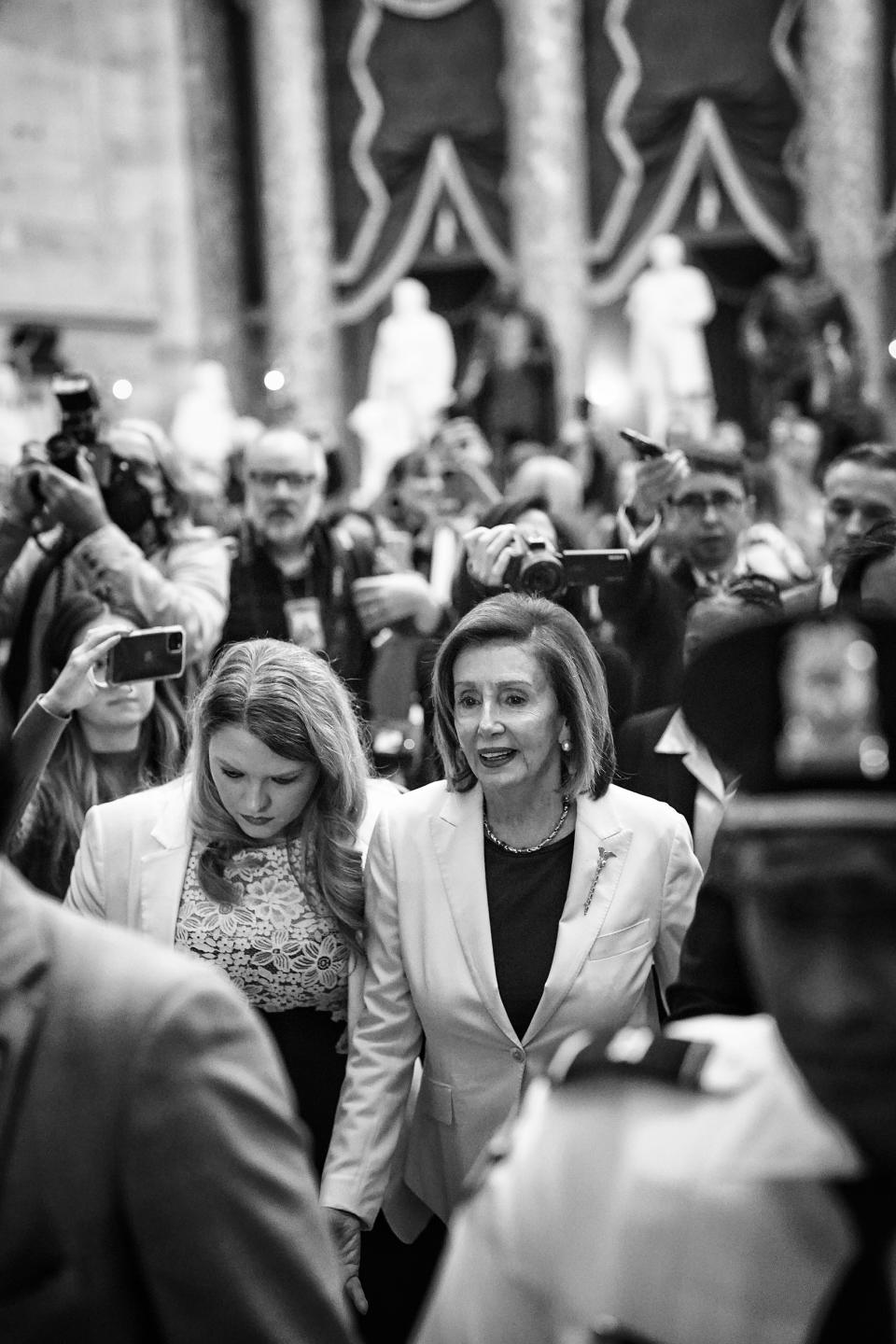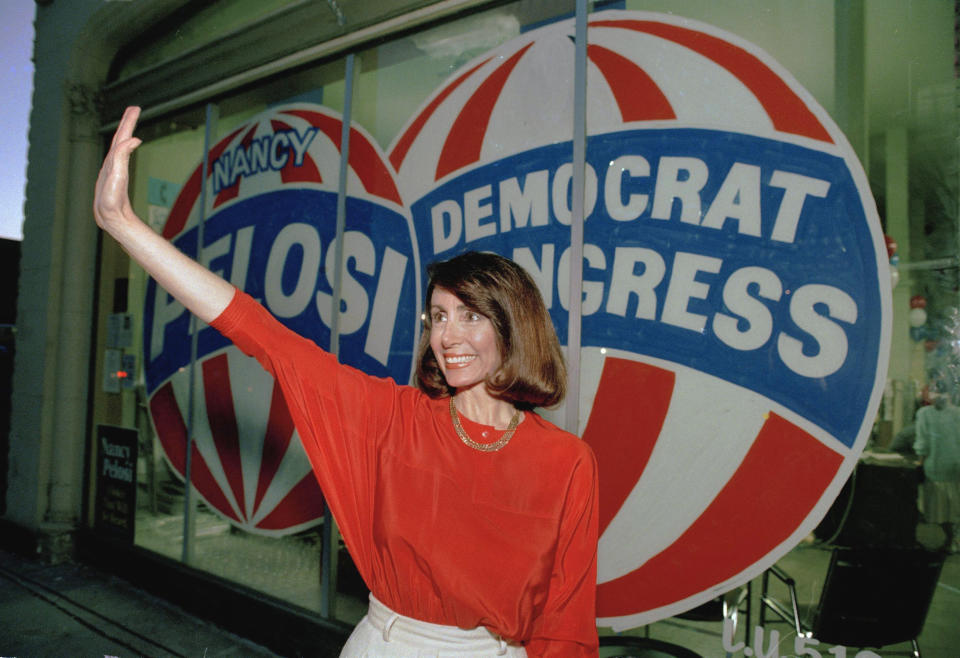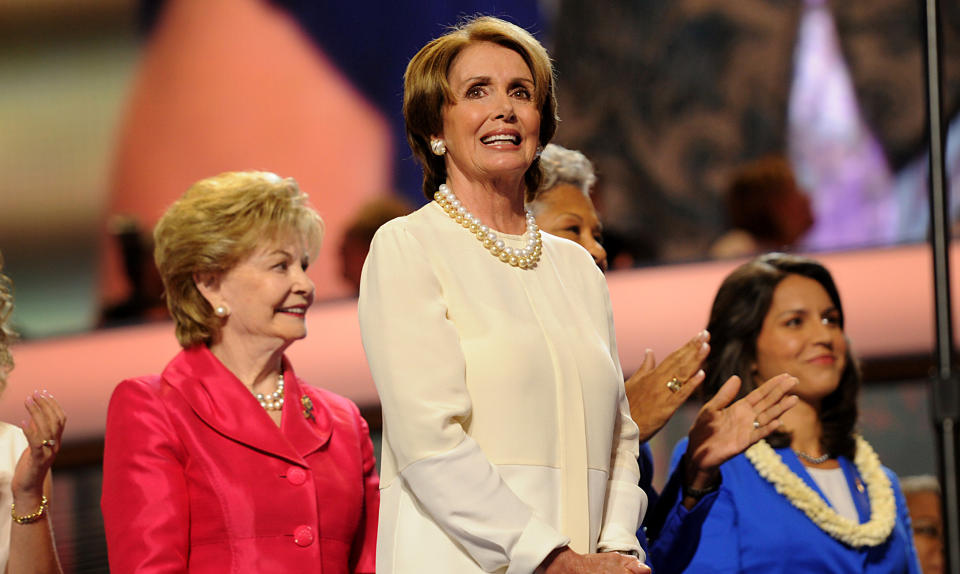Nancy Pelosi, the first female speaker of the House, says she’ll step down as Democratic leader
- Oops!Something went wrong.Please try again later.
- Oops!Something went wrong.Please try again later.
- Oops!Something went wrong.Please try again later.
- Oops!Something went wrong.Please try again later.
WASHINGTON — Nancy Pelosi, the first female speaker of the House, who helped shape many of the most consequential laws of the early 21st century, said Thursday that she will step down after two decades as the Democratic Party’s leader in the chamber.
“With great confidence in our caucus I will not seek re-election to Democratic leadership in the next Congress," Pelosi said in a speech on the House floor.
Pelosi was speaker from 2007 to 2011 and returned to the top job in 2019. She announced her decision just a day after NBC News and other news outlets projected that Republicans had flipped control of the House in last week’s midterm election, sending Pelosi and the Democrats back to the minority.
More personally, just weeks ago, her husband of nearly 60 years, Paul Pelosi, survived an assault by a hammer-wielding intruder at the family’s home in San Francisco.
Thank you all — and may God continue to bless the United States of America. pic.twitter.com/XDlQRwvDjY
— Nancy Pelosi (@SpeakerPelosi) November 17, 2022
Pelosi won't be leaving Congress after she won her 19th term last week. She is expected to remain, at least temporarily, given the GOP’s razor-thin majority.
As Pelosi took the mic, the chamber was packed with Democratic lawmakers, while the Republican side of the aisle was largely empty — a symbol of how politics have changed over Pelosi’s 3½ decades in the House. Minority Leader Kevin McCarthy, R-Calif., did not attend or watch the speech, citing "meetings," House Minority Whip Steve Scalise, R-La., was present. Senate Majority Leader Chuck Schumer, D-N.Y., crossed the Capitol to watch Pelosi speak, while the front row on the Democratic side of the chamber was filled with fellow female lawmakers from California.
Pelosi, 82, is one of the most powerful lawmakers of her generation or any other, and her departure will rob Democrats of strategic acumen and unmatched fundraising skills.
“She’s been at the center of the country’s biggest crises, initiatives and showdowns for a quarter-century,” Pelosi biographer Susan Page said. “People can certainly disagree with her policies and her tactics. She hasn’t done much to temper the partisan tone in Washington. But what you can’t disagree with is this: She has gotten things done, even when almost everybody else thought they were impossible.”

Pelosi's decision is expected to kick off a wave of generational change in Democratic leadership. House Majority Leader Steny Hoyer, 83, also announced Thursday that he will not seek another term in leadership. And Majority Whip James Clyburn of South Carolina, 82, will not seek any of the top three spots in leadership, but has indicated that he plans to stay on in an “advisory” role.
Pelosi nodded at the coming changing of the guard in her speech. "For me, the hour’s come for a new generation to lead the Democratic Caucus that I so deeply respect, and I’m so grateful that so many are ready and willing to shoulder this awesome responsibility."
Pelosi was a central player in passing the most significant laws in recent history, from President Barack Obama’s signature health insurance measure and President Joe Biden’s climate change initiative to President George W. Bush’s Wall Street bailout and President Donald Trump’s Covid-19 rescue programs.
"I have enjoyed working with three presidents achieving historic investments in clean energy with President George Bush, transformative health care reform with President Barack Obama and forging the future from infrastructure to health care to climate action with President Joe Biden," Pelosi said Thursday; she did not mention Trump.
Her legacy is also one of institutional leadership outside the lines of policy. As she and other congressional leaders took refuge from rioters during the Jan. 6, 2021, attack on the U.S. Capitol, Pelosi coordinated with Vice President Mike Pence, Mitch McConnell, R-Ky., then the Senate majority leader, and law enforcement to ensure the building would be cleared and Biden’s election would be certified that day.
The attempt to sack the Capitol led Pelosi to start a record second impeachment of Trump during his final days in office.
“She will go down in history, without equivocation, as the strongest, most effective, most powerful speaker the country has ever had. And her talents and skills are unmatched,” Rep. Jackie Speier, D-Calif., a top ally who represents a Bay Area district next to Pelosi’s, told NBC News. “So I feel very fortunate to have served under her because I don’t think we’ll see anything like it again.”
Biden spoke with Pelosi in Thursday morning and congratulated her on her historic tenure as speaker, the White House said.
"Because of Nancy Pelosi, the lives of millions and millions of Americans are better, even in districts represented by Republicans who voted against her bills and too often vilify her," the president said in a statement. "That’s Nancy — always working for the dignity of all of the people."
Political boss
Elected to the House in 1987 from a San Francisco-based district, Pelosi, the daughter and sister of Baltimore mayors, rose through the ranks of the House — from seats on its powerful spending and intelligence panels to Democratic whip, minority leader and speaker — on the strength of acute political instincts, big-time fundraising for a member of Congress and the ability to unify factions of an often-fractious caucus.

Colleagues have long pointed to her upbringing in old-school city machine politics — she kept a “favor file” for her father — to explain what often seemed like an innate sense of how to reward, punish and cajole them to win support in leadership elections and on the legislative battlefield.
In her speech Thursday, Pelosi referred to her first trips to the Capitol with her father, Thomas D’Alesandro Jr., when he represented Maryland in the House. “When I first came to the floor at 6 years old, never would I have thought that someday I would go from homemaker to House speaker,” she said.
Rep. Brendan Boyle, D-Pa., said: “She is the single best at the inside game that I’ve ever seen or served with. She remembers every time a person has been with her on a vote and every time a person has been against her, and that memory is very important in that type of a position.”
The fear of reprisal is one reason Pelosi hasn’t been seriously challenged in a leadership election since she first won the post of Democratic whip over Hoyer in 2001. Since 2003, she has been her party’s leader in the House, the longest streak in either party since Speaker Sam Rayburn, the Texas Democrat who died in 1961 after more than 21 years running his party.
“For a woman, she’s opened the doors wider for every last one of us,” said Rep. Debbie Dingell, D-Mich., who grew emotional talking about Pelosi. “And it’s not pleasant being on the other side of her, but I thank her for everything that she’s done.”

Early in her career, Pelosi demonstrated a rare touch for influencing colleagues.
When former Rep. David Obey, D-Wis., a progressive, launched a campaign for the chairmanship of the Appropriations Committee in 1994, Pelosi helped him whip votes to win the gavel, even though he was not the most senior member of the panel. The key, he said, was her knowledge of members’ interests and personalities.
“She had a book on everybody in her mind,” Obey recalled in a telephone interview Thursday. “She understood what made each member tick.”
Obey, who would return the favor by supporting Pelosi’s leadership bids, called her “virtually irreplaceable.”
But Pelosi’s longevity ultimately became a liability. Before the midterm elections, some of her fellow Democrats, including moderate Reps. Elissa Slotkin of Michigan and Abigail Spanberger of Virginia, openly called for fresh blood in the ranks of party leadership.
The calls continued in the days after the election — even with control of the House undecided.
“Whether we hold the majority or lose it by one to five seats, it’s time for a new generation of leadership. Period,” Rep. Dean Phillips, D-Minn., said shortly after the midterm elections.
Pelosi’s successor
The race to succeed Pelosi, as Democrats settle back into the minority after modest losses in this month’s midterm elections, is expected to feature a series of next-generation candidates. Hakeem Jeffries of New York, 52, the Democratic Caucus chairman, has been considered Pelosi’s heir apparent, and he would become the highest-ranking Black lawmaker in history if he were to win.

Pelosi has not indicated whom she would like to replace her as leader. Hoyer and Clyburn both endorsed Jeffries on Thursday. Hoyer called him "a skilled and capable leader who will help us win back the majority in 2024" and said "he will make history for the institution of the House and for our country" if he is elected leader. Clyburn also endorsed Reps. Katherine Clark of Massachusetts and Pete Aguilar of California for the No. 2 and No. 3 leadership spots, respectively.
Pelosi led Democrats to their first majority in a dozen years when they caught a blue wave in the 2006 midterm elections. Her colleagues rewarded her by making her speaker, a position she used to highlight America’s struggles in the Iraq War and the Bush administration’s role in the 2008 housing and finance industry crisis.
When Obama won the presidency that year, Pelosi and House Democrats expanded their majority. With newfound power and a Democratic Senate, they delivered an economic stimulus package, the so-called Dodd-Frank Wall Street regulations and the centerpiece of Obama’s agenda, the Affordable Care Act. Pelosi was particularly instrumental in squeezing the latter program into law, negotiating among centrist Blue Dog Democrats, her party’s dominant progressive wing and the bishops of her own Roman Catholic religion.

“Somebody asked me if this was a victory for Barack Obama. It’s not. This victory belongs to her,” Rep. Louise Slaughter, D-N.Y., the chairwoman of the Rules Committee at the time, said when the first version passed in the House. “As far as I know she never sleeps nor eats.”
The backlash to Obamacare helped Republicans knock Democrats out of power in the 2010 midterm elections, but Pelosi, with a smaller and more progressive caucus, held on to the reins of the party. She did it despite having been featured in millions of dollars of advertising against House Democratic candidates.
Eight years later, after Trump and Republicans tried to repeal Obamacare, she led Democrats to a midterm victory and was restored to the speakership.
CORRECTION (Nov. 18, 2022, 12:50 p.m. ET): A previous version of this article misstated how long Rep. Sam Rayburn of Texas led the Democratic Party in the House. It was more than 21 years, not 25 years.
This article was originally published on NBCNews.com

